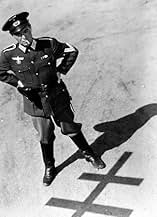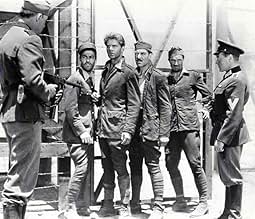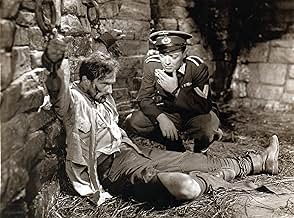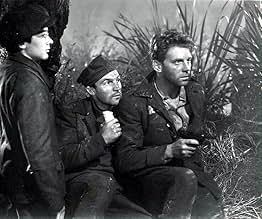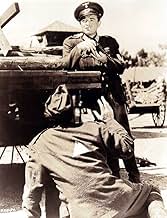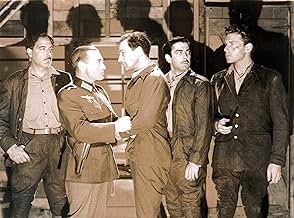Aggiungi una trama nella tua linguaA group of French soldiers during WWII are captured by German troops and sent to a POW camp. There they have to make use of his best resources to stay alive - and sane, while at the same tim... Leggi tuttoA group of French soldiers during WWII are captured by German troops and sent to a POW camp. There they have to make use of his best resources to stay alive - and sane, while at the same time scheming a way out.A group of French soldiers during WWII are captured by German troops and sent to a POW camp. There they have to make use of his best resources to stay alive - and sane, while at the same time scheming a way out.
- Regia
- Sceneggiatura
- Star
- Premi
- 4 vittorie totali
- Paul Duprez
- (as Jean Pierre Aumont)
- Father Sebastian
- (as Sir Cedric Hardwicke)
- Louis
- (as Billy Roy)
- René
- (as Jack Edwards Jr.)
- Baker
- (non citato nei titoli originali)
- French Soldier
- (non citato nei titoli originali)
- Col. Demas
- (non citato nei titoli originali)
Recensioni in evidenza
Director Tay Garnett was an acknowledged master of light and shadow, and not just in the cinematographic sense. Lots of issues are at stake here, and although all the characters are somewhat larger than life, the hesitant lawyer, wonderfully, luminously played by Jean-Pierre Aumont, and the cabdriver, acted by a young, doe-eyed Gene Kelly, both help to give human texture to the admittedly rather formulaic plotline, and neither is a hero in the textbook Hollywood sense. The most interesting conflict in the film would be how to deal with the Hume Cronyn character, a French soldier who sympathizes with the Nazis and serves as a translater / snitch in the POW camp. Should he be killed without a trial, or would that, even in wartime, be a violation of basic French principles of jurisprudence and democracy?
'The Cross of Lorraine' is a very, very good film and a far cry from American WW2 movies we see today, they are all much more banal and onesided.
The film was obviously inspired by Jean Renoir's ultimate antiwar movie, 'The Grand Illusion', and in its turn inspired Stuart Rosenberg's tough prison movie 'Cool Hand Luke'.
French soldiers who surrendered are duped by the Germans and are instead taken to a prison of war camp where they are subjected to the most terrible conditions.
Gene Kelly, in a non-singing role, is one such soldier. Punished for hitting German soldiers he is locked in solitary confinement.
In his brief appearance as a priest, Cedric Hardwicke shines as a brave, defiant messenger of the Lord. He pays the ultimate price for attempting to conduct a religious service for someone shot trying to escape.
There is also treachery and collaboration on the part of Hume Cronyn, a prisoner who because he could speak German was made an interpreter by the latter and apparently this went to his head. He also pays the ultimate price as in the ironic case of Peter Lorre, a German soldier caught up in an escape attempt and mistakenly killed by his fellow Nazis.
The ending shows the determination and courage of a local village. This film is a tribute to such people.
It's Jean-Pierre Aumont's film, he is the most interesting character, as you never really know where you have him, as he constantly has to change footing according to what is happening around him, while finally his character emerges in full glory. Gene Kelly is also quite good as an impossible slugger who is completely quashed by Peter Lorre and his Germans, but his annihilation is not quite complete. You can't keep down Gene Kelly for long.
It's the boy in the end who introduces the cross of Lorraine and lifts the whole performance to a higher level. This is very far from one of the best war films, but it certainly has some good scenes worth seeing.
I mean a propaganda film in the best way. Propaganda films made by the U.S. during World War II were often intended to inspire and show the people back home that their sacrifices meant something.
The Cross of Lorraine, referencing Joan of Arc's standard, adopted by Charles de Gaulle during World War II to mean the Free France, tells the story of French soldiers who surrender to Nazis and are lied to, and taken to a prisoner of war camp. There they endure terrible conditions and for some, death.
Hume Cronyn portrays a sniveling collaborator whom the Germans use as an interpreter. Cedric Hardwicke is a priest, whom he portrays with great dignity and quiet courage. Gene Kelly plays a defiant soldier put into solitary confinement. Jean-Pierre Aumont decides to cooperate with the Nazis on the surface only; he has another agenda. Aumont was older than God when he was still working in the '90s, and to see him as a young, gorgeous man, robust with incredible hair, is really something! The bravery of the French people is exhibited at the end of the film, when they make a decision to take action before the Nazis arrive at their town.
A really stirring film.
Lo sapevi?
- QuizThen the young Resistance fighter tells the escaped POWs that the Americans had landed in North Africa a few days previously, that date would be 8 November 1942. France surrendered to the Germans on 22 June 1940. So, Paul and Victor had spent about two years and four-and-one-half months as POWs.
- BlooperPaul flees with Victor in the ambulance, from the SS in their motorcycle/side car. The SS use a machine gun in an attempt to stop Paul. But the machine gun the Germans are using is a M1917 Browning water cooled machine gun, which is American, NOT German.
- Citazioni
Victor: [looks at cigarette he had taken out, referring to the Nazi captors] Ohh... let you keep your cigarettes and take away your matches.
[to Paul]
Victor: Maybe you can figure out a way to get me a light.
Father Sebastian: You might use the heat of your... indignation.
- ConnessioniFeatured in Stalag 17 (1953)
I più visti
Dettagli
Botteghino
- Budget
- 1.010.000 USD (previsto)
- Tempo di esecuzione
- 1h 30min(90 min)
- Colore
- Proporzioni
- 1.37 : 1


